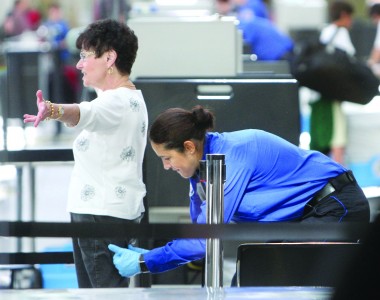
The Transport Security Administration (TSA) has started to use full-body scanners at 68 different airports around the country, making many citizens protest against it.
The scanners, which come in two types, millimeter and backscatter, take an image of the person and decide whether they have dangerous materials. The images are quite revealing and graphic.
“I’m okay with the TSA checking me out. If you got it, flaunt it. I don’t mind that they can see me as long as it’s anonymous,” Emily Greene ’12 said.
One concern is that the TSA officials will misuse the power of the scanners and the images made on it. New York Sen. Charles Schumer has recently proposed a legislation that makes misuse of the images a federal crime.
The TSA says that this should not be a concern, that they have implemented “strict measures to protect passenger privacy, which is ensured through the anonymity of the image.”
One TSA official administers the scan, while two officials, in a “remote” location, look at the image form the scan.
They then, using a walkie-talkie, tell the official who administered the scan what the results are. As soon as the scan is cleared, the image is deleted.
Another concern is that the scan is a violation of privacy. According to the TSA website, Americans are in support of full-body scanners, but that still leaves Americans dissatisfied with them.
Tessa Schroll ’13 will be flying to Germany during the winter holidays, and says she wouldn’t mind being scanned.
“I’d rather have them do it, than having the threat of a bomb… I don’t have anything against it. All they’re doing is protecting the flight,” Schroll said.
The American Civil Liberties Union calls the full-body scanners “virtual strip searchers,” condemning the TSA’s “naked power grab.”
The ACLU, which is dedicated to maintaining personal freedoms, has an entire guide on their website dedicated to educating Americans on the matter of full-body scanners, from what they do, to what their options are at the security checkpoint.
Micah Grand ’11 was traveling back from visiting his sister in Michigan in November when he was stopped by TSA guards.
“Maybe I looked kind of sketchy. I was wearing a pretty baggy flannel shirt and baggy jeans,” said Grand. Other than that, Grand had no reason to be stopped. But he got a “full-body x-ray, pat down, and frisk in a private room.”
“I think they thought I was trying to smuggle drugs,” said Grand.
Many other people are concerned about the levels of radiation emitted by the full-body scanner, which uses radiation to process the image.
The TSA denies this, saying that they have “less radiation than a cell phone.”
The scan is not a requirement; people also have the option of a thorough pat-down that will also be administered by a TSA official.












































